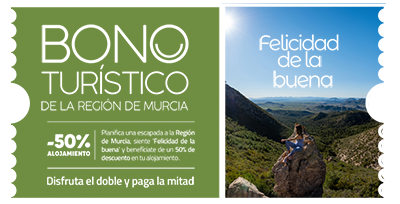The Region in 8 Routes
Discover
Do you want to be inspired?
Guided Visits
Top 10
Cultural, sports, ecotourism, even magical. There are routes to suit all ages and tastes. Take a look at our suggestions and get ready to discover the region. Don't forget your camera and wear comfortable shoes, because there is a long way to walk...
WATERWHEELS
Discover the importance of water in the Valle de Ricote as you walk all over the Waterwheels Route, which raise the river water towards the furthest areas. By walking along the banks of the River Segura you will learn about the work in traditional orchards and the customs of the inhabitants. The Big Waterwheel of Abarán is the largest functioning waterwheel in Europe.
WINE ROUTES
In the Region of Murcia, you can choose between three different wine routes: Yecla, Bullas and Jumilla. All 3 are certificated by ACEVIN (Spanish Association of Cities of Wine). Thanks to these routes, you can try our wonderful wines with Denomination of Origin, but you can also learn about the culture and the heritage of some charming little villages. If you love experiences, come and try this one.
COAST ROUTES
Either bike rides or walks near the beach. There are different routes in the Mar Menor area that you can do. It only depends on the difficulty and how you want to go about it. Hikers can follow several routes, either along cliffs and fossil dunes or sand paths. It is clear that spring and autumn are the best seasons to do these activities.
ECOTOURISM ROUTE
If you love long walks, the Northeast Green Route is your best option. This 80 km walk covers the old railway line that used to link the city of Murcia with Caravaca de la Cruz. It can also be traversed by bike or on horseback. It has different stretches where nature and heritage are mixed, as they go through some of the most beautiful villages in the region. If you decide to explore the whole region, get informed about the available hostelling network.
BAROQUE ART IN MURCIA
Strolling in the city of Murcia means walking through the Baroque era and admiring some 18th Century treasures, such as the Cathedral façade, designed by Jaime Bort. Most of the Baroque buildings here are religious institutions, among which the San Miguel, Santa Eulalia and San Juan churches stand out. But there is an essential reason for which Baroque art is so important in Murcia: Francisco Salzillo. The museum dedicated to this sculptor hosts some of his most important works, such as those that form La Santa Cena (Last Supper) or La Oración en el Huerto (Christ praying in the Garden), which are carried in the procession of Good Friday in the morning.
ALL ABOARD THE TRAIN!
If you like trains, you have to try the Railway Route of Águilas (Ruta del Ferrocarril de Águilas). This sightseeing tour will take you to the Embarcadero del Hornillo, a majestic mineral Pier built in 1903 which is still in place crossing the Mediterranean Sea. Moreover, you will visit the Railway Museum, where there are several model trains in motion. But these are only two of all the interesting stops that the route offers.
Senderos Azules
The Region of Murcia has 15 Blue Trails, making it the single-province community with the most of these trails. The Blue Trails, awarded by ADEAC, distinguish routes near the sea with a blue flag and, recently, inland trails in perfect condition.
ROMAN FOR A DAY
Follow the Romans' steps in Cartagena and find out what the ancient Carthago Nova was like. In the age of the Emperor Augustus, Carthago Nova was one of the most important ports in the Mediterranean Sea. Here you have a wide range of choices: from visiting a forum or a temple to being in an ancient patrician house and admiring its beautiful mural paintings. But that's not all: you can also go all over the Roman Theatre together with its architect, the great Vitruvius, who will tell you all the secrets of this masterful building.
OPEN DURING RESTORATION
How does a city and its heritage recover after an earthquake? In the city of Lorca you will get the answer by means of the route called Abierto por restauración, which will take you to the most touristic places in the City of the Sun in order to show you before and after of the earthquake. The Palacio de Guevara, the Ex Colegiata de San Patricio and the Iglesia de Santo Domingo are some of the best examples. Finally, you can make the most of your visit and learn about the heritage of Jewish culture by going to the old Jewish quarter and the Synagogue.
PILGRIMAGE SITES
Go on a pilgrimage in the holy city of Caravaca de la Cruz and discover the mysteries of this city of legend. You can see the house in the Calle de la Corredera where San Juan de la Cruz stayed when he visited the city and admire some beautiful churches such as the Compañía de Jesús and the convent of Santa Clara, the only enclosed convent that remains active in Caravaca. You can also walk from the medieval quarter to the Basílica-Santuario de la Vera Cruz (True Cross Sanctuary), where they will tell you the mysteries around the sacred relic and its miracle appearance in 1231.


